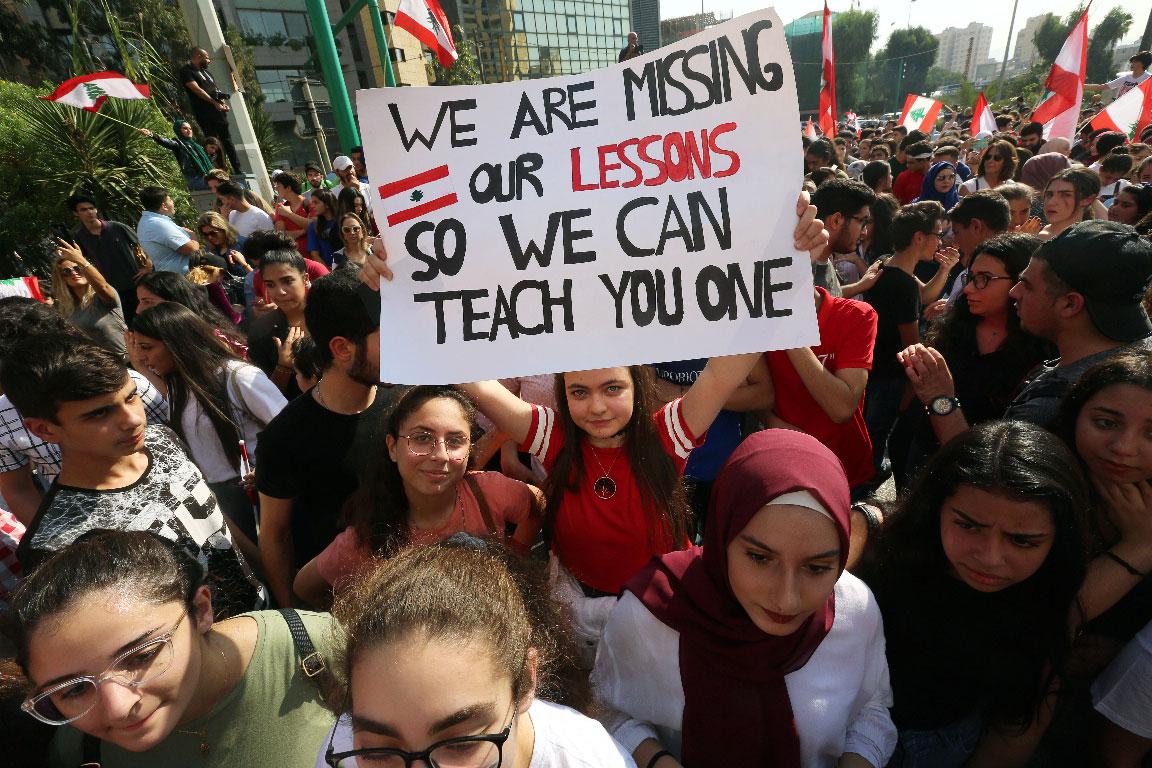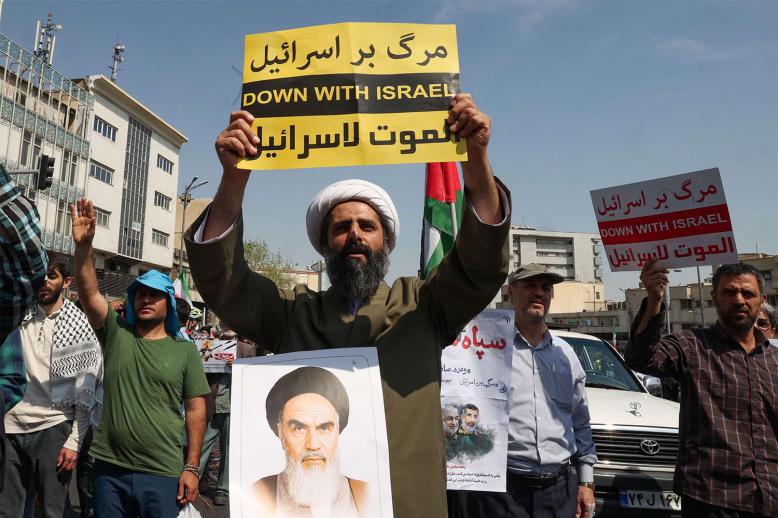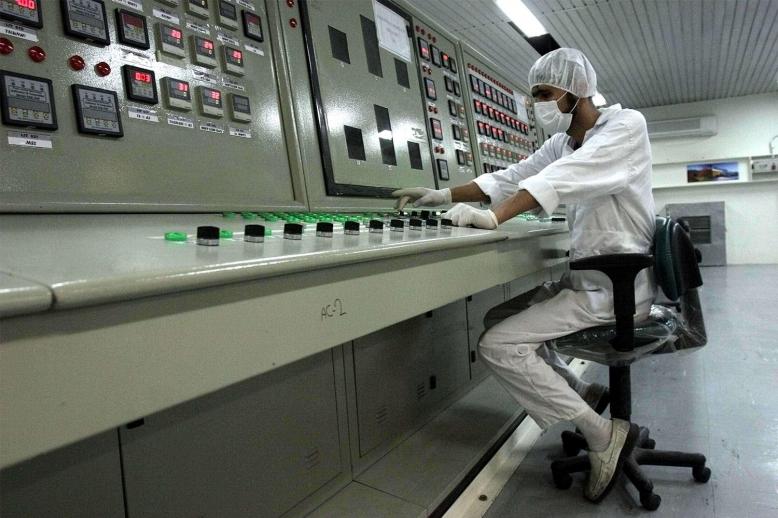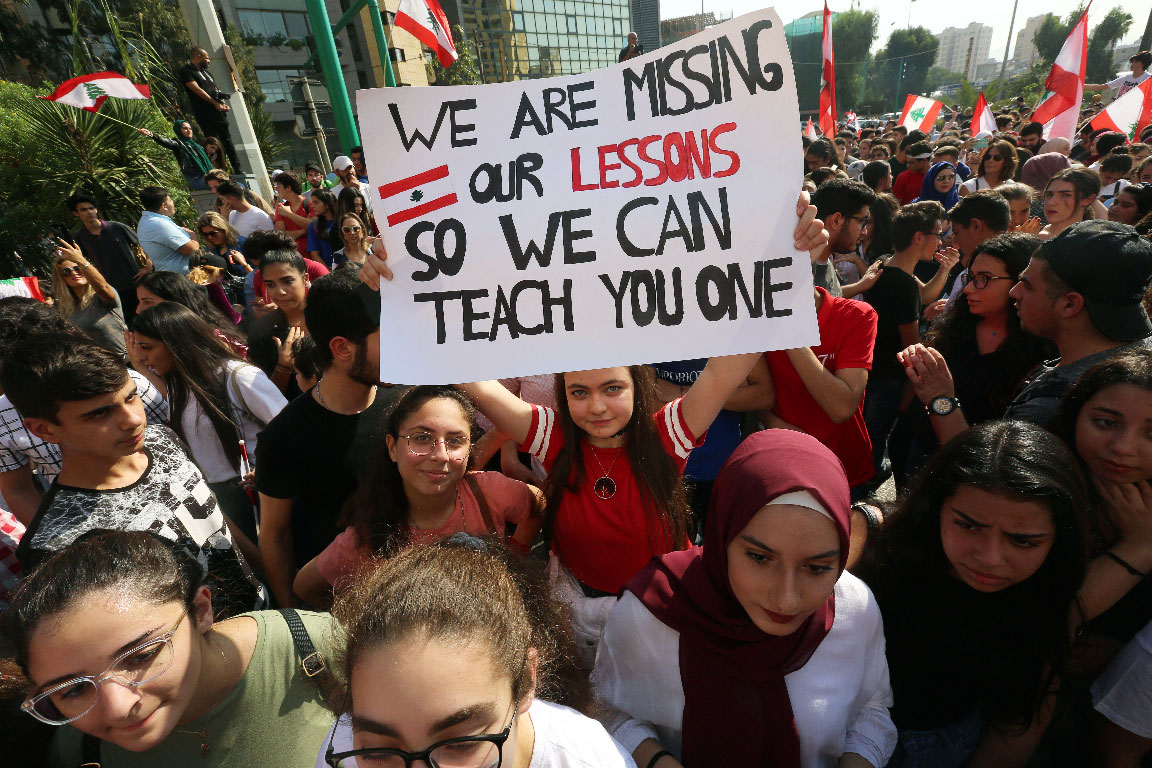Financial prosecutor orders graft probes as Lebanese protests swell
BEIRUT - Lebanon's financial prosecutor on Thursday ordered sweeping investigations into suspected corruption and waste of public funds by senior officials, the state National News Agency reported.
The move comes as a nationwide protest movement over poor services, economic woes and official corruption enters its fourth week with demonstrators hoping to expel an elite they say has ruled the country like a cartel for decades.
Financial prosecutor Ali Ibrahim has launched probes into customs authority chief Badri al-Daher over suspected "waste of public funds", NNA reported.
It said he had ordered an inquiry into "all the ministers of successive governments since 1990".
Protesters have been demanding an overhaul of the political elite, which has hardly changed since the end of the country's devastating 1975-1990 civil war.
The prosecutor's decision came after lawyers brought a case against the officials in question over alleged misappropriation or use of public funds for personal purposes, along with "abuses of power which caused significant damage to Lebanese citizens", the agency said.
Authorities have proposed similar probes in recent days to show they are fighting corruption, but that has done little to calm public anger.
Probes and reforms
On Thursday, the financial prosecutor questioned former premier Fouad Siniora for three hours over $11 billion allegedly spent during his period in office from 2006 to 2008, the NNA said.
Siniora has in the past denied all accusations of misappropriation of public funds.
On Wednesday, the financial prosecutor filed a lawsuit against a senior Beirut airport official over alleged money laundering and bribery, NNA reported.
Last month, another prosecutor pressed charges against former prime minister Najib Mikati over allegations he wrongly received millions of dollars in subsidised housing loans, charges he denies.
Lebanon is ranked 138th out of 180 countries in Transparency International's 2018 corruption perceptions index, with key sectarian leaders accused of running demi-fiefdoms.
President Michel Aoun, who has pledged various reforms to combat corruption, gave assurances Wednesday that the next government would be made up of ministers free of any suspicion of corruption.
Prime Minister Saad Hariri tendered his government's resignation on October 29 in response to pressure from the street.
The cabinet has stayed on in a caretaker capacity but efforts to form a new line-up seem to be stalling, with each faction in the outgoing coalition arrangement seeking to salvage some influence.
Students take to streets
Thousands of students took to the streets across Lebanon to demand a better future as the anti-government protests continued to spread.
Pupils carrying their schoolbags picked up the baton from thousands of women who ignited the main protest site in Beirut on Wednesday evening by banging pots and pans to demand their rights.
In Tripoli, where mobilisation has been relentless since the protests erupted on October 17, demonstrators planned to take down the giant portraits of politicians plastered all over the city's buildings.
Grievances initially focused on poor infrastructure and abysmal public services quickly grew into an unprecedented nationwide push to drive out the country's political elite
Thousands of university and high school students streamed into the streets of Beirut and other towns to boost the protests.
"All of them, all of them are thieves," chanted one pupil, perched on the shoulders of a schoolmate outside the education ministry.
Setting off coloured flares and waving Lebanese flags, students blocked off traffic to demand the wholesale removal of the current political class and its sectarian-based power-sharing system.
"What if we had a young, educated, ethical and competent political leadership?" was the question asked on one placard.
Political posters
"We go to school, we work hard and in the end we pick up diplomas so we can just hang around and stay at home doing nothing," said Marwa Abdel Rahman, 16.
Youth unemployment stands at more than 30 percent in Lebanon, from which many young people were seeking to emigrate until last month's rallies created a rare moment of national hope and unity in a country often characterised by its divisions.
What started as a spontaneous, apolitical and leaderless popular movement, is becoming increasingly organised, with activists coming together to synchronise marches and stunts across the country.
After blocking off roads for days, protesters have switched to preventing access to institutions seen as the most egregious examples of mismanagement and corruption.
Students in Tripoli blocked employees from clocking in for work at the telecommunications ministry building.
"We want to keep up the pressure on our corrupt political leaders, who are not addressing our demands," said Samir Mustafa, an unemployed 29-year-old.
"They want to name a prime minister from the old guard, from the corrupt class," Mustafa said. "We will continue to block banks and key administrations until the president and the parliament fall."
Women lead
The World Bank on Wednesday warned that the failure to quickly form a government that meets protesters' demands could lead to an even sharper economic downturn.
President Michel Aoun is reported to remain bent on keeping Foreign Minister Gebran Bassil, his son-in-law and arguably the most reviled politician among the protesters, in a key position.
For his part parliament speaker Nabih Berri, a veteran player whose supporters tried to disrupt the protests last month, has not publicly commented at all on the protests sweeping the country.
In a country where weapons are widespread and leading political parties routinely resort to hired thugs, the protests - and attempts by the security forces to quell them - have been remarkably bloodless.
On Wednesday night, thousands of women staged a candle-lit rally on Martyrs Square, banging pots and pans with wooden spoons to set downtown Beirut abuzz.
The commotion, broadcast live on several television channels, turned contagious and for several minutes residents could be heard across the city chiming in from home with their own utensils.
"Revolution is a woman," read one of the banners in the crowd, which launched into a rousing rendition of the national anthem, adapting the lyrics to reflect the feminist nature of the demonstration.





